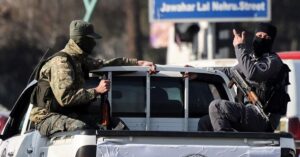…… President lacks political will to tackle problem – NEF
…… Presidency declines comment
Northern Elders Forum (NEF) has blamed the current insecurity in the North on failure of leadership and what it termed “irresponsibility of governance.”
Speaking to newsmen after the forum’s meeting in Zaria, Kaduna State, at the weekend, NEF Chairman, Prof. Ango Abdullahi, called on President Muhammadu Buhari to demonstrate higher level of concern and sensitivity to the plight of traumatised citizens, especially in Zamfara, Katsina, Kaduna, Benue, Niger, Plateau and Taraba states.
Efforts to get the reaction of the Presidency proved futile as Garba Shehu, one of the media aides to the president, declined to respond to several calls and text messages made to his cell phone.
Apart from the Presidency, NEF also slammed the the other ties of government for failing to address and arrest the abject poverty and under-development in the nation.
It said Nigeria has the resources and ideas but lack political will to tackle the problems.
“There is serious irresponsibility of governance in the country, especially in the North; the leadership is not doing enough to meet up the challenges of poverty and under-development.”
“We also demand a decisive, comprehensive and fundamental government actions against poverty, underdevelopment and insecurity affecting North as well as show leadership and compassion which are reciprocal expectation of the Nigerian people,” Ango said.
He said recent report of an international organisation revealed that 90 per cent of the over 13.5 million children out-of-school in the country were from the North.
“The children will be adult in the next 10 years; no education,no vocational training, what do you expect then? Insecurity situation.”
Ango said the Forum last year had passed vote of no confidence in elected political leaders from North starting from President Muhammadu Buhari, governors and Assembly members over the issue of poverty and under-development.
He expressed sadness that instead of development, northern states were living under horrendous Boko Haram threats, banditry, kidnapping, armed robbery, marauding youth gangs, herders and farmers mini wars.
“It has become imperative for the forum to call President Muhammadu Buhari to respond to threats faced by northern Nigerians following incessant killing s in the some states.”
He said the forum had also engaged former president, Goodluck Jonathan, on the need to address the Boko Haram insurgency and proffered solutions to the problems in 2012.
He said NEF could not remain silent and watch criminal activities and bloodletting escalate across the country, especially in the north.
“Agriculture, which is our pride and major employer of labour and contributor to Gross Domestic Product has been ruined as rural dwellers are living in perpetual fear of terrorists or bandits attacks while highways become death traps to travelers.”
Ango said NEF strongly believed that President Buhari has capacity to tackle insecurity situation but might not have political will to do.
“Why are the problems becoming difficult to solve? Is it because of the challenges of under-funding the police and security apparatus or is it the challenge of problem analyses or policy failure?” he asked.
Ango described the recent revelations of the new Inspector-General of Police during 2019 budget defence before National Assembly as a testimony of the administration’s weakness in handling the nation’s security arrangement.
“The new IG revealed that government has approved N324 billion to the Nigeria Police in the 2018 budget but only N25 billion was released, representing less than 10 per cent of the total amount approved.”
He said the new IG had disclosed that the entire strength of Nigerian police has not exceeded 300,000.
“It is ironical to expect any significant achievement in the nation’s security under this kind of attitude in a country with more than 200 million,” he said
The Forum, however, said Nigeria has just emerged from a challenging and harrowing set of elections, which ought to provide strategic turning points in the manner that political leaders should respond to national challenges.








